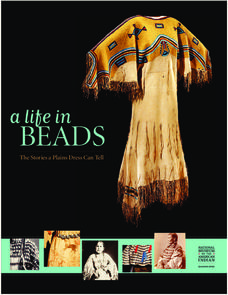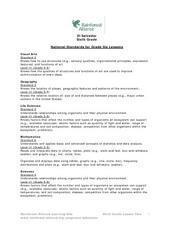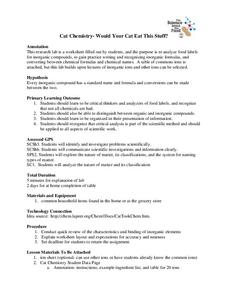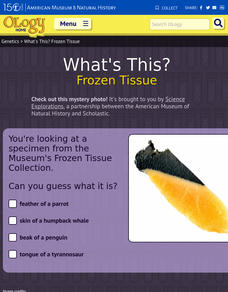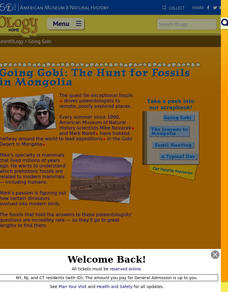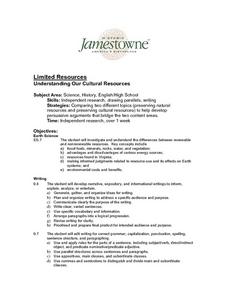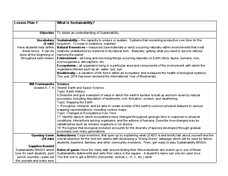Mathematics Vision Project
Module 6: Congruence, Construction, and Proof
Trace the links between a variety of math concepts in this far-reaching unit. Ideas that seem very different on the outset (like the distance formula and rigid transformations) come together in very natural and logical ways. This unit...
Indian Land Tenure Foundation
Relationships to Places
Young historians take a look at how the Indian tribes of California promoted a mindful relationship between people and the land. They begin to understand how the Indians were champions of conservation, and at preserving the natural...
Smithsonian Institution
A Life in Beads: The Stories a Plains Dress Can Tell
Young learners discover how the Sioux and Assiniboine tribes preserved native culture through the making of traditional dresses, identifying the resources used to make the dresses and discussing behind the meaning behind some American...
Indian Land Tenure Foundation
Respect for Land
Youngsters examine how people show respect and care for the land. Specifically, learners see how the Native Americans truly did care for and respect the land, and still do so to this day! They also explore how they themselves can care...
Curated OER
Keep America Beautiful: Thinking Green in the Classroom
Stress the importance of community involvement to preserve the beauty of our Earth with these great ideas.
National Park Service
What Can We Do?
Motivate young conservationists to stand up and make a change. After learning about the efforts in Cascade Nation Park to reduce carbon emissions in order to preserve the wilderness, young scholars work in groups creating action plans...
Illinois Department of Natural Resources
Section Four: How Can We Protect Biodiversity?
Look into the future with a lesson plan on biodiversity and natural habitats. Learners read articles about different perspectives when it comes to planning future development, and decide which angle is the highest priority in a group...
Curated OER
El Salvador: Whose Breakfast Isn't for the Birds?
Sixth graders investigate the understanding of where coffee is grown by conducting a survey. They study the natural history of coffee and examine bird habitats in the areas where coffee is grown. They write letters to explaining the...
Curated OER
Earth: Our Big Blue Marble
Students investigate Earth and its resources. In this Earth, space, and nature lesson plan, students collaborate to design presentations on the Earth, its cycles, and how humans have impacted the planet. Images, diagrams, and background...
Clever Student Training Company
Logical Fallacies Recognition
“Should same-sex marriage be allowed?” As part of a study of recognizing logical fallacies learners read John Stemberger’s April 12, 2012 argument against same-sex marriage published on the opinion page of the Orlando Sentinel. They then...
One Pot Learning
Reading Comprehension Worksheet
Three annotated passages from Ralph Waldo Emerson's essay on "Nature" provide young philosophers a chance to improve their reading comprehension skills as they gain insight into Emerson's ideas.
It's About Time
Impact Events and the Earth System
What would happen to Earth if an asteroid struck it? Assist young scientists as they explore the mechanics of an impact event and effects caused by it; calculate the energy released once an asteroid strikes Earth's surface; and compare...
University of Georgia
Would Your Cat Eat This Stuff?
Processed foods use inorganic compounds for flavoring and preservation. This take-home laboratory challenges scholars to find 20 different compounds identified on the labels of foods to list on their data collection sheet. The activity...
National Nanotechnology Infrastructure Network
Silver and Bandages: Assessment of Inhibition of Bacteria by Silver Colloid-Impregnated Bandages
Silver: more than jewelry, it's also a natural antimicrobial agent. An inquiry-based lesson asks collaborative groups to design and implement an experiment to test this property. Using samples of silver nanoparticles and a strain of...
American Museum of Natural History
What's This? Frozen Tissue
Take a peek into thousands of frozen samples. Learners try to identify an image of a piece of frozen tissue. After choosing the correct answer, scholars find out more information about the American Museum of Natural History's Frozen...
It's About Time
The Nitrogen and Phosphorous Cycles
How do we affect the ecosystem, and what can we do to preserve it? Pupils explore chemicals that promote and inhibit plant growth, then discuss the importance of nitrogen and phosphorus to the survival of organisms and describe how...
American Museum of Natural History
A Whale of a Tale
What's the most interesting fact about a blue whale? Learners read an interview about the similarities between the Titanosaur and the blue whale displays at the American Museum of Natural History. Pupils learn not only about blue whales...
American Museum of Natural History
Going Gobi: The Hunt for Fossils in Mongolia
Take a trip on a fossil hunt. Pupils read about a trip to the Gobi Desert by a group of paleontologists to find fossils. Learners view pictures taken on the trip and determine what the scientists go through in the search for answers to...
Curated OER
Personal Power Figures
Students create African Personal Power Figure boxes describing how they view themselves and discuss what personal traits are important to the preservation and improvement of a civilization.
Curated OER
Limited Resources - Understanding Our Cultural Resources
Learners examine and compare preserving natural resources and preserving cultural resources. They conduct Internet research on two topics, and write a position paper on whether cultural resources or natural resources are more important...
Curated OER
What Is Sustainability
Students investigate the concept of how people are dependent upon natural resources and how they can apply them to be maximized in usefulness. The students are encouraged to develop an appreciation for the environment. They conduct a...
Curated OER
Drawing on Kenaf
Students explore kenaf, a tree-free paper. In this environmental issues lesson, students draw pictures following a presentation about the origin and "eco-friendly" nature of kenaf.
Curated OER
Conservation 'Ad'vice for National Parks
Students discuss ways that the public can damage as well as preserve our natural and cultural resources. Small groups are each assigned one of the national parks and must design a poster or TV commercial that celebrates the importance of...
Curated OER
Ecotourism in National Parks and Wilderness
Students research a wilderness or natural area and develop a plan for ecotourism.




